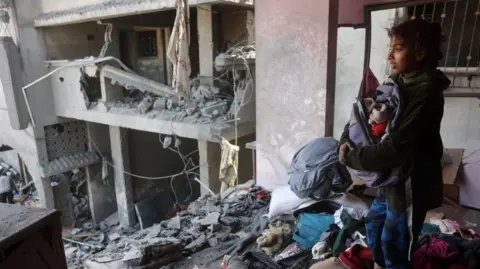Israel has “resumed combat in full force” against Hamas in the Gaza Strip, Prime Minister Benjamin Netanyahu said on Tuesday night.
In a defiant video statement, he warned that “negotiations will continue only under fire” and that “this is just the beginning”.
His comments came after Israeli aircraft launched massive airstrikes against what the military said were Hamas targets in Gaza.
More than 400 people have been killed in the attacks, the Hamas-run health ministry said, and hundreds more injured.
The wave of strikes was the heaviest since a ceasefire began on 19 January.
The fragile truce had mostly held until now, but this new wave of attacks suggests plans for a permanent end to the war may be off the table.
The airstrikes which hit Beit Lahia, Rafah, Nuseirat and Al-Mawasion Tuesday shattered the relative peace that Gazans had been experiencing since January, and hospitals are once again overrun with casualties.
The attacks on Gaza have been condemned by Egypt, a mediator in the talks.
The air strikes are “a blatant violation” of the ceasefire agreement and represent “a dangerous escalation”, said Tamim Khallaf, the spokesman for the country’s Ministry of Foreign Affairs.
“I was shocked that the war started again, but at the same time, this is what we expect from the Israelis,” Hael a resident from Jabalia al-Balad told BBC Arabic.
“As a citizen, I’m exhausted. We’ve had enough – a year-and-a-half to this! It’s enough,” he added.
Key Hamas figures were killed in the airstrikes, including Major General Mahmoud Abu Watfa, deputy interior minister in Gaza and the highest-ranking Hamas security official.
In his address, Netanyahu said Israel had tried to negotiate with Hamas to release the Israeli hostages still being held in Gaza. He accused Hamas of rejecting the proposals every time.
Israel and Hamas have disagreed on how to take the ceasefire deal forward since the first phase expired in early March, after numerous exchanges of Israeli hostages and Palestinian prisoners.
The deal involves three stages, and negotiations on the second stage were meant to have started six weeks ago – but this did not happen.
Instead, the agreement was thrown into uncertainty when the US and Israel wanted to change the terms of the deal, to extend stage one which would see more hostages released.
That would have delayed the start of phase two, which was meant to establish a permanent ceasefire and required Israeli troops to pull out of Gaza.
But Hamas rejected this proposed change to the agreement brokered by US, Qatari and Egyptian mediators, calling it unacceptable. BBC Verify: mapping Israel’s wave of strikes
Also See: Israel Hit by First Fatal Attack Since Gaza Ceasefire Began
On Tuesday evening, Netanyahu said Israel would continue to fight to achieve all of its war goals – “to return the hostages, get rid of Hamas and make sure Hamas is not a threat to Israel.”
US President Donald Trump’s administration was consulted by Israel before it carried out the strikes, officials said.
The US National Security Council spokesman Brian Hughes said: “Hamas could have released hostages to extend the ceasefire, but instead chose refusal and war.”
Hamas warned the resumption of violence by Israel would “impose a death sentence” on the remaining living hostages held in Gaza, and accused Israel of trying to force it into a surrender.
Speaking to the BBC about the attacks, Dr Sabrina Das, an obstetrician training Palestinian doctors in southern Gaza, said: “It was all very sudden… everybody’s mood was just shattered because we knew it was the start of the war again.”
Dr Das said her colleagues in Nasar hospital were “up all night operating” because “mass casualties had started coming in again”.
Mohammed Zaquot, director general of the Gaza Strip’s hospitals, told BBC Arabic “the attacks were so sudden that the number of medical staff available was inadequate for the scale of these large strikes, and additional teams were called in immediately to assist”.
A group representing hostages’ families has accused the Israeli government of choosing “to give up the hostages” by launching new strikes – and has been protesting outside the Israeli parliament.
The news of the strikes terrified some of the families of Israeli hostages still being held by Hamas.
“The Israeli government is not perfect, and Israel is not doing enough, because my brothers are not home”, Liran Berman, whose twin brothers are still being held in Gaza, told the BBC.
“But if Hamas wanted, the hostages would be back. They are in their hands.”
Israel says Hamas is still holding 59 hostages, 24 of whom are believed to be alive.

The war was triggered when Hamas attacked Israel on 7 October 2023, killing about 1,200 people and taking 251 back to Gaza as captives.
Israel responded with a massive military offensive, which has killed more than 48,500 Palestinians, Gaza’s Hamas-run health ministry says, and caused huge destruction to homes and infrastructure.
This news is sourced from BBC and is intended for informational purposes only.

![Netanyahu says Israel resumes full-force combat in Gaza, killing 400+ as ceasefire collapses; Hamas vows retaliation. [Image via AP]](https://southasiatimes.org/wp-content/uploads/2025/03/AP25077692975328-1742344299.webp)
![Ukrainian and Russian flags with soldier silhouettes representing ongoing conflict. [Image via Atlantic Council].](https://southasiatimes.org/wp-content/uploads/2026/02/2022-02-09T000000Z_1319661209_MT1NURPHO000HXCNME_RTRMADP_3_UKRAINE-CONFLICT-STOCK-PICTURES-scaled-e1661353077377.jpg)



![Truck traveling along the Makran Coastal Highway in Balochistan, with rugged cliffs and the Arabian Sea coastline in the background [Image via Getty Images].](https://southasiatimes.org/wp-content/uploads/2026/02/Balochistan-2.webp)